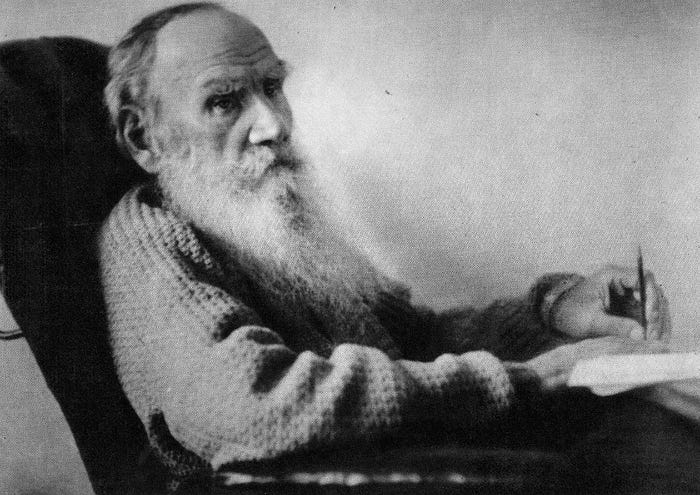Force and Fatalism
Day 320 of A Year of War and Peace

The genius of Tolstoy’s prose is that its natural realism, rollicking in freedom yet unadorned by style, grounds the reader in a seductive simplicity that suffers the subtle introduction of his themes. Today, for instance, we join the Russian soldiers at camp. Tolstoy draws us in by means of his description of keen frost, falling snow and purple-black starry sky. With his words one can feel the crunch of winter ground, the chill leaping down the throat with each breath, and the sharp mental perception born of the shock of the cold. From here it’s an easy invitation into the world of the working soldiers. We’re with them as they cajole and curse and make merry and prepare their camp. All the while, secretly hovering above it all, is a central question in Tolstoy’s theory of history: How is it the awesome freedom of the masses is subjugated to the terrible truth of historical determinism?
This question is dramatized today in the interaction between the Russian soldiers and the officer corps. The infantry regiment boasts roughly nine hundred soldiers. Once they arrive at their halting place for the night they get to work preparing camp. Some go to get firewood. Some go to get food. Others tend to a scattered array of duties. Tolstoy describes these soldiers as a “huge, many-limbed animal.”
The officer corps, on the other hand, file into a small hut and start sipping tea and talking with each other.
Their conversation is interrupted, however, by the rude explicatives of the laboring soldier class outside. To remedy this impropriety the officers send one of their own out to correct this poor behavior. The officer’s method of correction, by means of a swift blow to the back of a single soldier, is the employment of Gibbon’s inflexible maxim of Roman discipline that a good soldier should dread his officers far more than his enemy.
It gets the job done. The soldiers continue quietly with their work, leaving the officers free to sip their tea in peace.
What is so striking about this scene is that the officers can fit inside a single hut while the strength of the common soldiers is such that they can move a wattle thirty-five feet long and seven feet high through uncomfortable winter conditions with energy to spare. How easy it would be for them to revolt, Manor Farm style, against the sometimes cruel rule of their superiors. Yet they don’t. Why? This is, in part, the question Tolstoy is trying to answer in the historical discourses of War and Peace. What, he asks, is the animating force that powers the sweep of history?
DAILY MEDITATION
Nothing appears more surprizing to those, who consider human affairs with a philosophical eye, than the easiness with which the many are governed by the few; and the implicit submission, with which men resign their own sentiments and passions to those of their rulers. When we enquire by what means this wonder is effected, we shall find, that, as Force is always on the side of the governed, the governors have nothing to support them but opinion. It is therefore, on opinion only that government is founded; and this maxim extends to the most despotic and most military governments, as well as to the most free and most popular.
David Hume, Essays Moral, Political, Literary